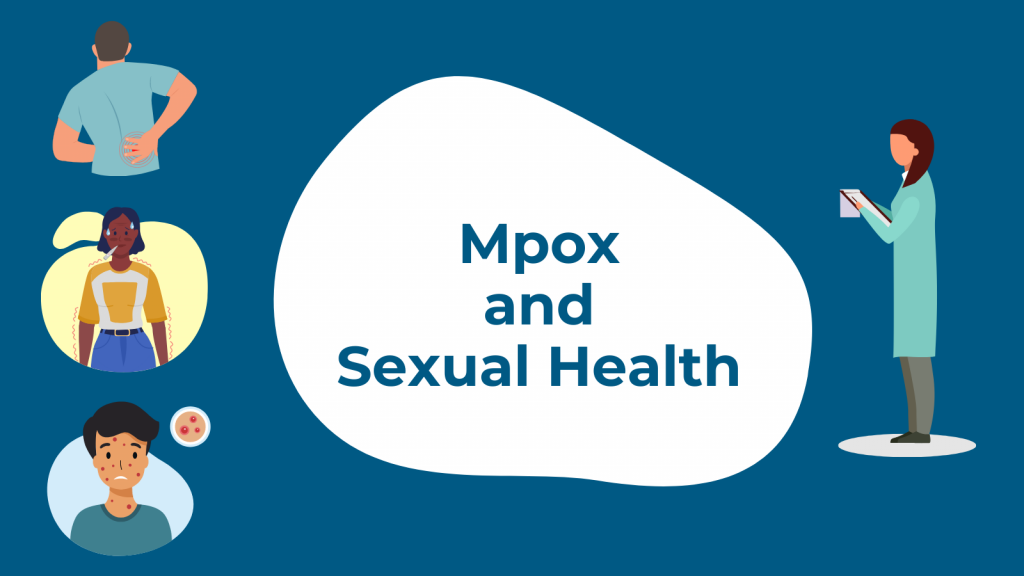In May 2022, a small number of cases of a rare disease called mpox (previously referred to as monkeypox) were reported in the U.S., Canada, and several European countries—places where the disease isn’t usually found. Widespread changes in the behaviors of gay, bisexual, and other men who have sex with men who were disproportionately impacted by the infection were credited with slowing the outbreak last summer.
New cases emerged in summer 2023 and in 2024, the World Health Organization declared a global health emergency amid rising cases of mpox in at least thirteen African nations. In 2025, new cases of a more dangerous type of mpox were diagnosed in California. Read on to learn more about mpox and ways you can protect your sexual health.
What is mpox?
Mpox is an infection caused by a virus. The mpox virus can be spread through close skin-to-skin contact with a person who is infected. Given that, mpox can be passed on by intimate sexual contact. Most of the cases in the U.S. have been diagnosed have been among cis men who have sex with men, but mpox can affect anyone of any gender or sexual orientation.
How is someone exposed to mpox?
Mpox causes sores (see more on that below) on the skin. It’s contact with these sores, or fluid from these sores, that can spread the disease. So skin-to-skin contact, or contact with an infected person’s towels, clothing, or bedding, can pass on the infection. The Centers for Disease Control (CDC) also notes that the virus can be spread by saliva respiratory secretions, so kissing and extended intimate contact present a risk. Currently, though, it’s not clear if mpox can spread through semen, vaginal fluids, urine, or feces.
CDC reports that some people can spread mpox to others from one to four days before their symptoms appear. There is currently no evidence showing that people who never develop symptoms have spread the virus to someone else.
What are the symptoms of mpox?
The first symptoms are usually fever, headache, muscle aches, and backache. The infection may also cause swollen lymph nodes and exhaustion. A few days after these first symptoms, a rash or sores (as discussed above) can appear. The rash or sores often start on the face and then spread to other areas of the body, including the genitals, where the sores might be mistaken for herpes or syphilis.
Symptoms can last 2-4 weeks, and the infection usually resolves on its own. However, if you have any symptoms, especially an unusual rash or sores, it’s important to see a health care provider for an accurate diagnosis.
The Mpox Vaccine
There is a vaccine called JYNNEOS that can protect against mpox and smallpox infections. The vaccine is given in two doses, four weeks apart. As with most vaccines, the mpox vaccine isn’t 100% effective, but getting vaccinated with two doses is an important way to prevent mpox. Vaccination makes the chance of getting and spreading mpox less likely and helps makes symptoms less severe if a person is infected.
Currently, the CDC recommends mpox vaccine if:
- You had known or suspected exposure to someone with mpox
- You had a sex partner in the past 2 weeks who was diagnosed with mpox
- You are a gay, bisexual, or other man who has sex with men, or are transgender or nonbinary and in the past six months have had any of the following:
- A new diagnosis of one or more sexually transmitted infection (e.g., chlamydia, gonorrhea, or syphilis)
- More than one sex partner
- Sex at a commercial sex venue
- Sex related to a large commercial event or in a geographic area (city or county for example) where mpox virus transmission is occurring
- You have a sex partner to whom the above applies
- You anticipate experiencing any of the above scenarios
- If you are traveling to a country with a clade I mpox outbreak and anticipate any of the following activities during travel:
- Sex with a new partner
- Sex at a commercial sex venue
- Sex in exchange for money, goods, drugs, or other trade
- Sex in association with a large public event (e.g., a rave, party, or festival)
- You are at risk for occupational exposure to orthopoxviruses (e.g., certain people who work in a laboratory or a healthcare facility).
You can learn more and find an mpox vaccination site near you on the CDC website
Taking Care of Your Sexual Health
As a reminder, mpox infection is rare and there have been very few cases in the United States. Most of the cases continue to be among people at higher risk for mpox who have not been vaccinated. But there are things you can do to reduce the already low risk.
- Get vaccinated: Two doses of the vaccine offer the best protection
- Get tested: If you have been in close contact with someone who has mpox or have any symptoms associated with mpox, see a health care provider and get tested.
- Talk to your sex partners: This is always a good idea and a great way to take care of your sexual health.
Get More Information








